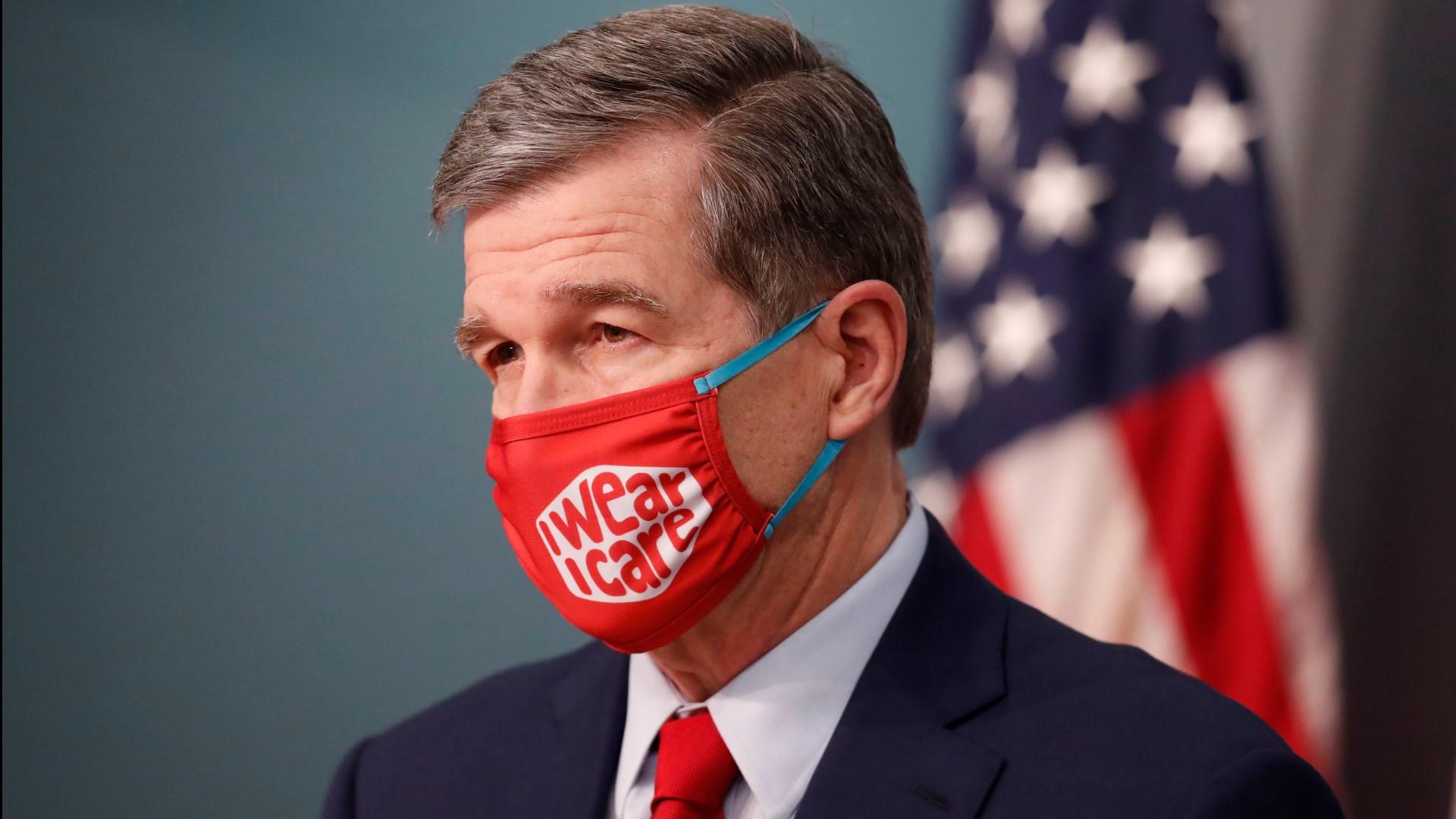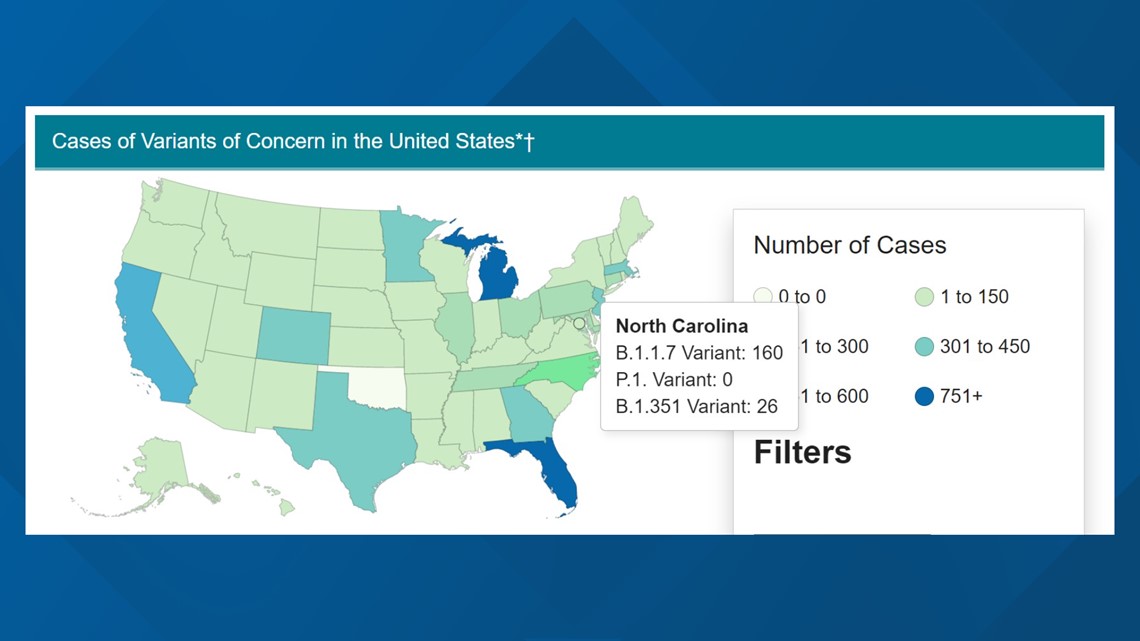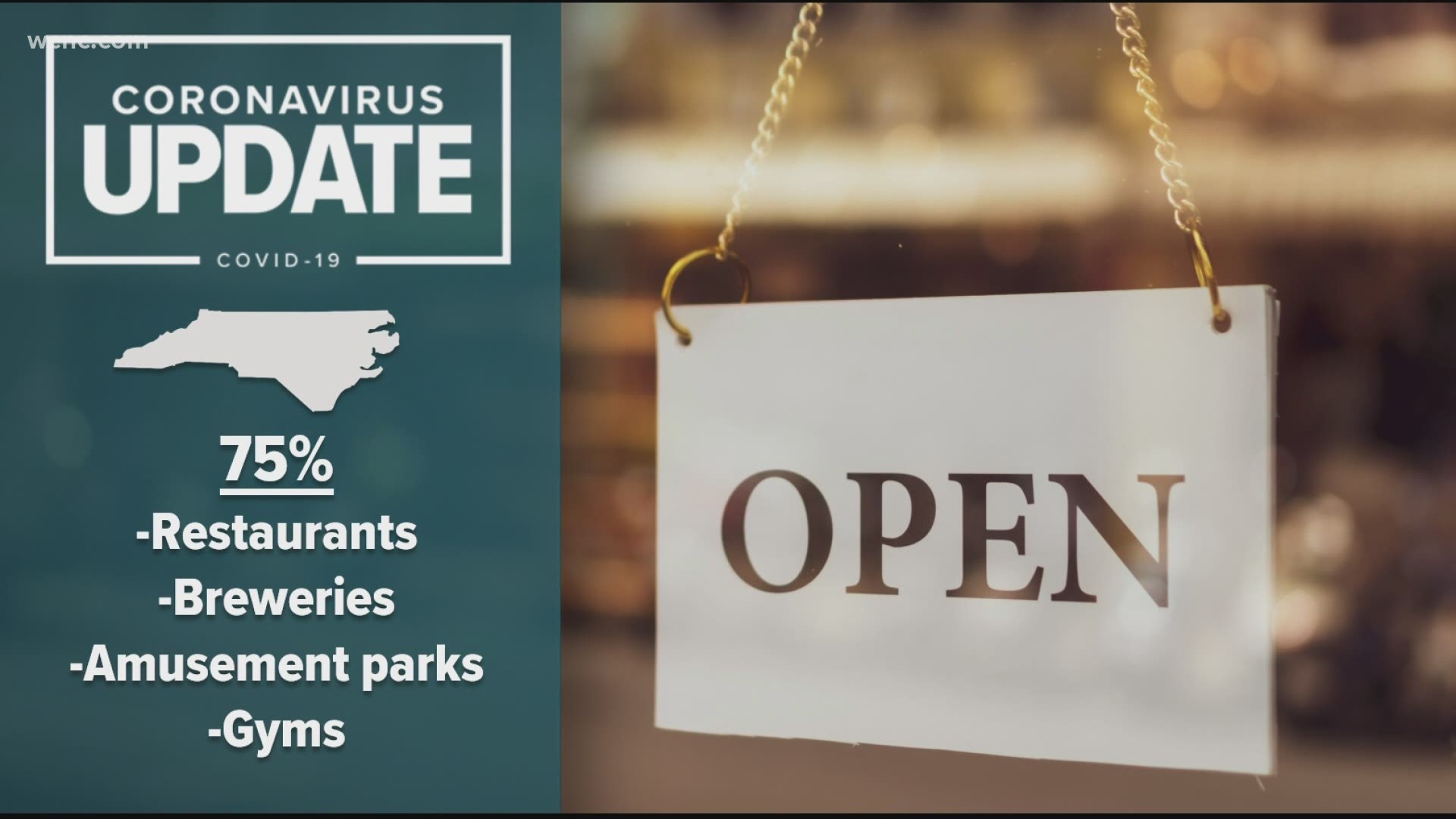Gov. Cooper eases COVID-19 restrictions; mask mandate and social distancing still remains
Gov. Cooper's newest Executive Order, which goes into effect on Friday, March 26, will ease capacity limits at several businesses in the state.

With North Carolina's COVID-19 metrics continuing their downward trend, Gov. Roy Cooper announced that he will ease the COVID-19 restrictions for the state.
“Our fast and fair vaccine distribution and our sustained progress with the COVID-19 metrics tell us we can move forward with easing restrictions if we do it safely,” Cooper said.
Executive Order No. 204 will take effect March 26 at 5 p.m. is set to expire April 30 at 5 p.m.
Here's what's changing and what's not
Strong safety protocols, including the mask mandate, will remain in place.
"It will be as important as ever to stay socially distant and use good judgment," Cooper said.
Indoors and outdoors up to 100% capacity, subject to masks and 6-feet social distancing
- Museums and aquariums
- Retail businesses
- Salons, personal care and grooming businesses, tattoo parlors
Indoors up to 75% and outdoors up to 100% capacity, subject to masks and 6 ft. social distancing
- Restaurants
- Breweries, wineries and distilleries
- Recreation (e.g., bowling, skating, rock climbing)
- Fitness and physical activity facilities (e.g., gyms, yoga studios, fitness centers)
- Pools
- Amusement parks
Indoors and outdoors up to 50% capacity, subject to masks and 6-feet social distancing
- Bars
- Movie theaters*
- Gaming facilities*
- Meeting, reception and conference spaces
- Lounges (including tobacco) and night clubs
- Auditoriums, arenas, and other venues for live performances
- Sports arenas and fields (includes professional, collegiate, and amateur
*Movie theaters and gaming facilities may operate at up to 75% capacity outdoors.
Activities and settings that are a lower risk when they involve interacting with fewer people, being outside, keeping masks on the entire time, keeping interactions with people short (under 15 minutes), staying physically distant, and avoiding singing, yelling, and cheering, according to public health officials.
The state's 11 p.m. curfew for on-site alcohol consumption will also go away under the new executive order, and gathering limitations will increase to 50 people indoors and 100 people outdoors.
"These are significant changes, but they can be done safely. We have said all along that the science and data would be our guide in this dimmer switch approach, and they show we can do this," Cooper said.
Businesses react to the changes
Red Rocks Cafe, with locations in North Carolina and South Carolina, is starting to see guests return as more people are getting the vaccine.
“We have people every single day mention that this is the first time they’ve been out to a restaurant,” John Love, co-owner and managing partner of Red Rocks Cafe, said.
Red Rocks Cafe has had to shift its business to accommodate for an increase in curbside and takeout orders. It has also been limited to 50% capacity for dine-in service since May 2020.
“It has been ups and downs and one day at a time for us,” Love said.“This time last year we were completely closed down. We were confused.”
The restaurant will now be allowed to open its indoor dining room to 75% capacity and outdoor space to 100 percent capacity if it chooses to. Love said safety will still be the top priority.
“I feel very, very encouraged about the future,” Love said. “We’re just excited about the way things are going, and we think they’re going to continue to get better. And we’re going to try to be really good, smart operators and keep everyone safe.”
Sammy’s Neighborhood Bar in Pineville was closed down from March 2020 until October 2020.
“When we first opened, it was really slow,” Ashley Smith, a bartender at Sammy’s, said.
Smith said business has slowly gotten better, but the bar has been limited in sales by on-site alcohol consumption curfews.
She added that the bar has been losing out on business, with some customers crossing the state line to get a drink in South Carolina where bars can stay open till 2 a.m.
"We're lucky that we're still here,” Smith said.
Bars in North Carolina were most recently limited to 30% capacity indoors. Starting Friday at 5 p.m., they will be allowed to open at 50% capacity and stay open till 2 a.m.
It also is promising news for businesses like What The Fries Charlotte, which opened its first brick and mortar restaurant on Tuesday as the announcement was made by the governor.
"Perfect timing," Alicia Barnes, the administrative director at the restaurant, said.
The business started from a popular food truck.
As they opened their doors at 50% capacity under the current restrictions, they were ecstatic to know they will be able to increase capacity to 75% inside on Friday evening.
"Another 30 seats will be open. That's big for us," said Kaila Williams, the manager for the restaurant.
Behind the Numbers: How COVID-19 metrics played a role
Factoring into the easing of restrictions, was the improvement in the state's key COVID-19 metrics.
NCDHHS Sec. Mandy Cohen said the state's daily cases, percent positivity, and coronavirus-related hospitalizations have improved significantly since the January peak.
The percentage of positive tests remains under health officials' goal line of 5%, and reports of COVID-like symptoms are declining and approaching baseline levels.
However, state health officials remain cautious about other metrics.
Cohen noted that, while cases have largely been declining, they have recently begun to plateau, which could signal a stalling in progress. Cohen said that metric needs monitoring, particularly with more-contagious variants present in the state.
Last Tuesday, the Centers for Disease Control and Prevention was reporting 43 variant cases, mostly B.1.1.7 (also known as the U.K. variant), in North Carolina. Since then, that number has mostly quadrupled, with 186 cases. Federal health officials estimate B.1.1.7 could make up 30% of the new infections in the U.S., and the variant is still on track to gain dominance in the coming weeks.


Still, Cohen said there is room for more easing of restrictions, as long as people remain on guard, and the state's "dimmer switch" approach pointed to focusing changes on lower-risk settings.
"Those lower-risk settings are ones where you have fewer people or where you can keep masks on the entire time, you have good ventilation or are outdoors, and activities like singing yelling and cheering are really avoided," Cohen said.
Impact on schools
Cooper and other North Carolina lawmakers announced a bill that requires all public schools to offer some in-person learning for middle and high school students and full-time in-person classes for elementary kids.
On Tuesday evening, the Charlotte-Mecklenburg Schools Board of Education discussed a recommendation from superintendent Earnest Winston to bring older kids into the classroom four days per week. The board voted 8-1 in favor of bringing students back.
Middle and high school students at CMS schools will return to in-person learning four days a week starting April 12. Then May 10, all CMS students will be learning in-person five days a week.
The CDC also recently changed its guidelines, now saying students can safely sit three feet apart instead of six feet. Masks and handwashing are still required.
"They don't spread it like adults do, they're masking, we don't have a lot of evidence within studies in schools that they're big spreaders," Novant Health Dr. David Priest said.


